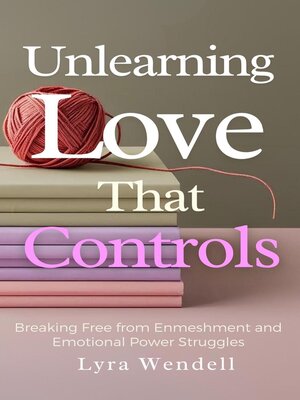
Sign up to save your library
With an OverDrive account, you can save your favorite libraries for at-a-glance information about availability. Find out more about OverDrive accounts.
Find this title in Libby, the library reading app by OverDrive.



Search for a digital library with this title
Title found at these libraries:
| Library Name | Distance |
|---|---|
| Loading... |
What if the love you were taught to trust... was quietly erasing you?
We often learn to associate love with sacrifice, silence, or guilt. We shape ourselves to be agreeable, keep the peace, and meet emotional needs that were never ours to carry. But over time, we lose touch with our voice, our boundaries, and our sense of self. Unlearning Love That Controls is a gentle and empowering guide to help you recognize emotional control, rebuild your sense of agency, and redefine what it means to feel safe in love.
This is not a book about blaming others—it's about coming back to yourself.
Whether you've experienced emotionally manipulative relationships, struggled to say no without guilt, or simply feel like your needs always come last, this book offers insight, clarity, and practical tools to support your healing. Drawing from trauma-informed psychology, nervous system regulation, and real-life patterns of codependency and emotional enmeshment, you'll learn how to create relationships that honor both connection and individuality.
Through eight compassionate chapters, you will:
If you've ever wondered:
"Why do I feel responsible for how others feel?"
"Why do I shrink myself in love?"
"Why do I still feel unsafe, even when no one is shouting?"
—this book will help you uncover the deeper answers, and guide you gently toward change.
This book is for the quiet givers. The emotional fixers. The ones who learned love by earning it.
It's for the adults healing from childhood emotional entanglement, for those who fear setting boundaries, and for anyone longing for love that doesn't require disappearing.
You'll find real, actionable tools for emotional regulation, self-trust, and relationship repair—not with perfection, but with presence.
🔍 Ideal for readers who:







